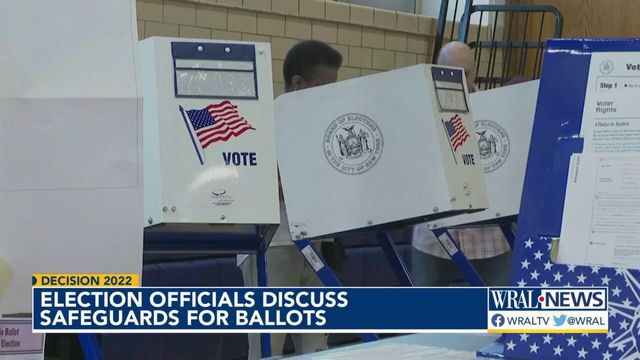NC Votes 101: Could your vote be hacked in NC?
After the 2020 election, allies of former President Donald Trump insisted that foreign powers had hacked into voting machines and changed the outcome of the presidential election. Conspiracy theorist and MyPillow chief executive Mike Lindell, a noted proponent of the claim, even came to North Carolina in March to give a presentation about it in Surry County.
While there's no evidence to prove hackers accessed equipment or changed votes anywhere in the U.S., state officials say it would be especially hard for hackers to break into North Carolina's voting system.
Some states do allow modems in voting machines, but North Carolina is not one of them. In fact, state lawmakers outlawed modems in voting machines here in 2018.
Prior to 2018, some counties did use modems to report their results more quickly. It was actually the state elections board that requested the ban. Board spokesman Patrick Gannon said the agency proposed the changes "out of an abundance of caution and to promote voter confidence that results could not be manipulated."
In 2021, elections workers discovered a few very old voting machines in six counties that still had modems in them. Karen Brinson Bell, the state's elections director, said the modems weren't connected to phone lines and wouldn't have been usable.
"We have disconnected and removed those from the voting systems," Bell told WRAL News. "And in safeguards prior to even doing that, the software that's necessary and the coding that's necessary to even be able to transmit by modem is not in any of our voting equipment or voting systems any longer."
Under state law, voting machines and tabulators here cannot have any connectivity, whether that's phone, internet, wireless or Bluetooth. They also cannot have remote access software.
This means north Carolina's voting equipment is “air-gapped” — it cannot be accessed externally.
Bell said that's one of two air gaps keeping your vote safe from hackers.
After the close of polls election night, the results from each precinct are collected on a secure flash drive.
"It's special in our systems," Bell explained. "It's not just one you bought down at Target or something."
Those flash drives, along with paper print-outs of the data, are physically delivered by election workers to the county elections office.
At the county office, the data from each precinct’s flash drive is added up on a computer that is also not connected to the internet.
"They then take a clean flash drive or USB drive and transport those results from that computer that has done the tabulation over to an a system where we have protections in place and protocols and multi-factor authentication and so forth to connect to our election-night reporting system," Bell explained.
The results — which are unofficial at this point — are uploaded to the state from that connected computer.
"So, many gaps in there to ensure the safety and security of our data as it's being transmitted," Bell said.
After the election, hand-eye audits of paper ballots are used to double-check the reported results in a certain number of randomly-selected precincts. If votes were being changed, the audits would discover it.
The results are only official after they've been audited and the county election board has voted to approve them at the canvass, which is ten days after the election.
Bell said North Carolina has a further safeguard: We don't allow electronic voting. All votes must have a paper record. Even touchscreen machines used by voters with disabilities must still produce a paper ballot. After they're counted, all ballots are kept in secure storage for up to 22 months for a federal election, so any discrepancy in data can be reconciled by a recount.













